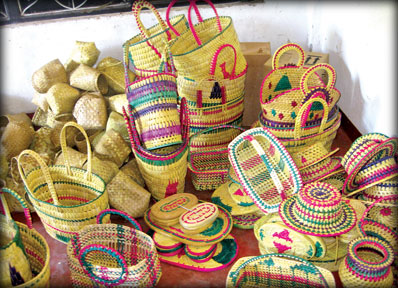'New technology vital to enhance quality of palmyrah products'
By Lalin Fernandopulle
The palmyrah industry which had been a main source of income for
people in the North has been revived. The Palmyrah Development Board and
the Palmyrah Training Centre in Kilinochchi have given a fresh boost to
the once vibrant and lucrative industry.
Toddy tappers, sap collectors and product manufacturers are again in
business with new aspirations to make a living from the rich palm. The
Palmyrah Training Centre supported by the Palmyrah Development Board
grooms a large number of youth to manufacture various products using all
parts of the tree.
 |
|
Palmyrah products |
The Centre provides a one-year training program to manufacture, bags,
baskets, boxes, mats and brushes. The first batch has been trained and
new recruits are mastering the art of manufacturing palmyrah products.
Palmyrah Development Board, Chairman Passupathy Seevaratnam said that
there is a demand for palmyrah-based products and added that steps will
be taken to market them.
The absence of a stable market and price for products are major
challenges hampering the growth of the palmyrah industry. "Our products
are admired but there is no market for it," a palmyrah product
manufacturer said.
Many towns and cities have resumed business but not on a large scale.
The private sector has a major role to play in reviving business in the
North. A processing centre to be set up shortly by Cargills Plc in
Kilinochchi will be shot-in-the-arm for the palmyrah industry.
"A few shops buy these products in small quantities. We need more
buyers so that we could manufacture them on a regular basis," said a
manufacturer.
The palmyrah industry came to a standstill due to terrorism. The
growth of the industry was stifled leaving a large number of people
unemployed.
Palmyrah toddy, treacle, jaggery, sweets and sugar candy are some of
the products of the palmyrah palm which has enormous potential to be a
dynamic industry that could provide a large number of jobs and a stable
income to many.
The palmyrah industry has been an integral part of the people in the
North. The North is also known as the Palmyrah jungle. Palmyrah trees
adorn either side of the A-9 road that leads to Jaffna in vast swathes
of land beyond Vavuniya.
The unique factor of the palmyrah tree is that it is a
multi-beneficial palm. Almost all parts of it can be used to manufacture
products.
The growth of the tree is slow and it takes over 15 years to bear
fruit. Acres of palm trees were destroyed due to the battle against
terrorism. A drive on the roads towards the North reveals the extent of
damage to palmyrah trees. The leafless barks reveal the destruction.
The steps taken to replant trees will encourage cottage industries
which depend on palmyrah products. The palmyrah leaf is used for roofing
and as a fence. The wood is used for roofing and the fibre is used to
manufacture brushes. The ridge of the leaf is used to make ropes.
About 450 families depend on the plamyrah industry in Kilinochchi. A
tapper earns around Rs. 1,500 a day. The Palmyrah Products Cooperative
Society in Kilinochchi helps in marketing Palmyrah products. A palmyrah
tree produces around 15 litres of sap a day during the season from
January to July. Handicrafts are made throughout the year. Tapers do
other cultivations during the off-season.
The use of conventional methods to extract sap and produce sweet
products is a drawback for the industry. New methods should be
introduced to increase quality and quantity and ensure a better price
for products.
Cargills Agri-foods, DGM, Haridas Fernando said that new technology
will be introduced to induce sap and enhance the quality of
palmyrah-based products.
The art of tapping and manufacturing palmyrah products is passed down
from parents to children. Sustaining the age-old industry is a challenge
due to the younger generation moving to more prestigious jobs. Youth do
not want to be called tappers. The palmyrah industry would be confined
to the older generation if there is no change of attitude and
recognition for the industry.
The Palmyrah Development Board conducts awareness programs to educate
youth on the potential of the industry. Educating manufacturers on
customer requirements is also vital. The male and female palms are used
to tap toddy. The drink is distilled to produce jaggery. A kilogram of
jaggery is Rs. 500.
The toddy tastes sweet when fresh, but it turns sour when
fermentation sets in. A little bit of lime is put into the pot in which
the toddy is collected to sweeten the beverage. The sweetened toddy is
used to make jaggery.
The Palmyrah Development Board plans to introduce new technology with
the support of the private sector to enhance the quality of treacle and
jaggery which are considered nutritious and healthy.
|



